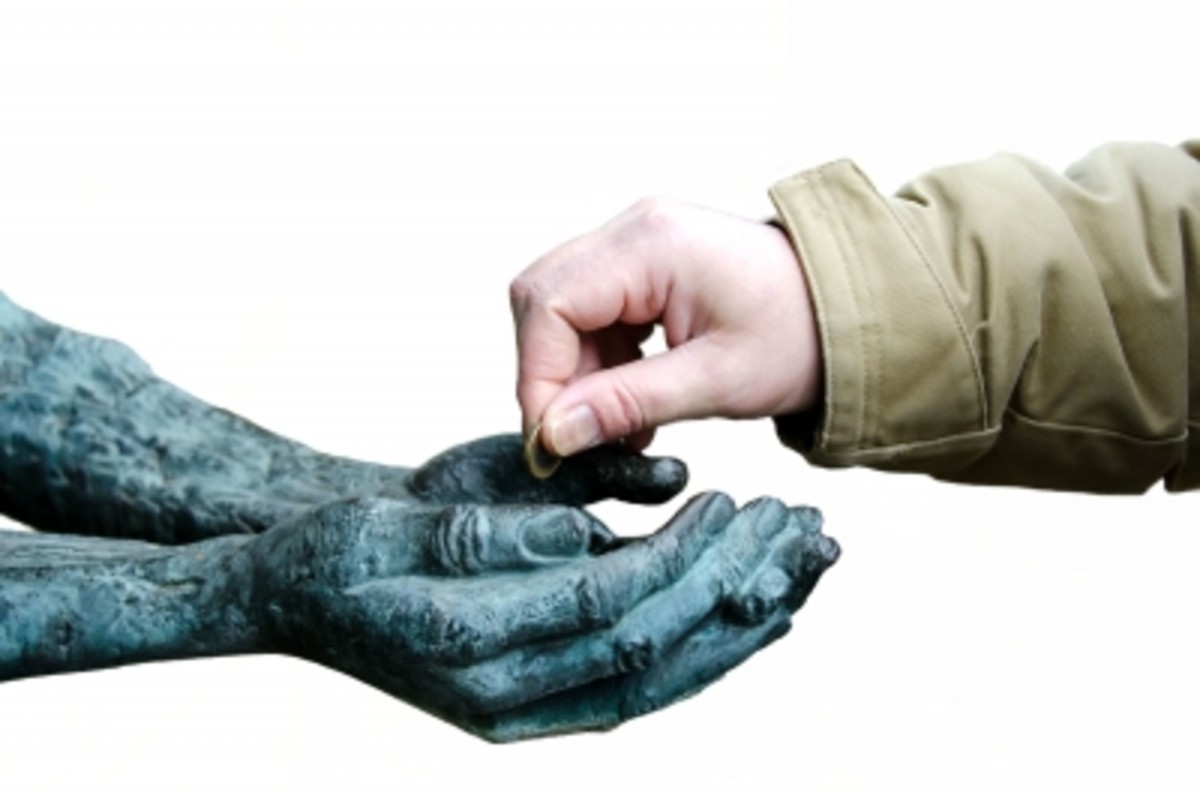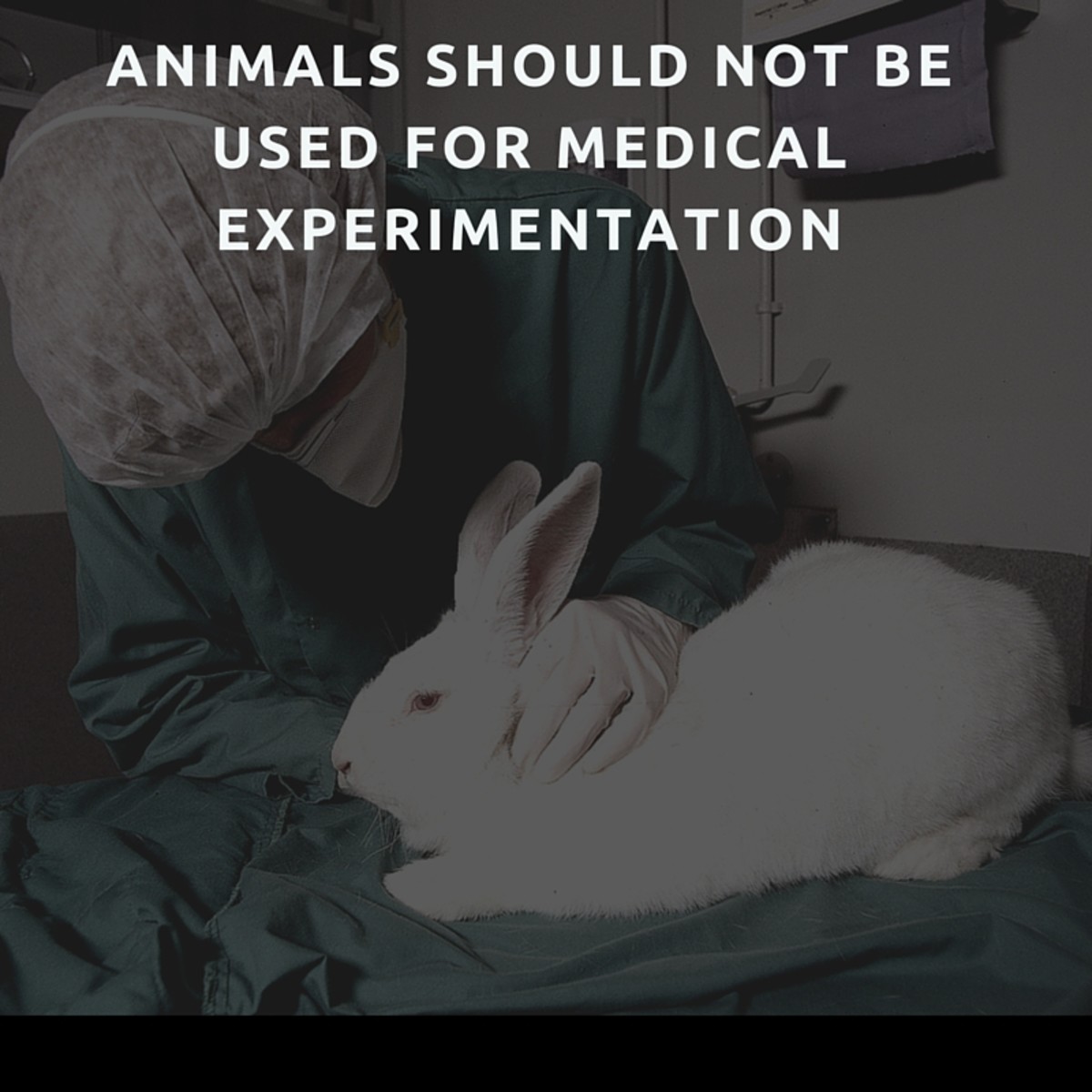Charity - Is Charitable Giving Ever Wrong?
First Lessons in Learning To Give

Where Does Charity Begin?
There are some who would say that charitable giving is never wrong because it is a moral responsibility, a form of social contract, to which we are a party solely by being born into the human race.
But just because we are born into this contract does not mean we know how to fulfill it. For that, we become "students of giving", starting in childhood and continuing through life, making progress or falling behind, as we would in any course of study. At some point, we may have to ask ourselves if charitable giving is still right, even though we may have gotten some of the lessons very wrong.
Learning To Give
My first memory of charitable giving was dropping coins in the collection basket at church on Sunday mornings. My mother was very clear about why the coins would go to the church. Handing me the coins she would say, "These are for the children less fortunate than you." At the time, I didn't understand exactly what "less fortunate" meant or how the money would get from the church to the children, but since I did know that the church was always right, I was happy to accept that my coins would eventually be held by a child just like me, only less fortunate. It was the right thing to do, God would bless me for doing it, and that made me feel good. These were valuable early lessons in charitable giving. Not only did I learn that I had a familial and religious responsibility to give to those who needed help, I also learned that giving made me feel good.
As I grew older, the answer to the question "Why give?" became more complex. Certainly, helping others and feeling good about it remained a sufficient answer, but now I could add other reasons for giving, such as the financial savings inherent in personal tax deductions, the business contacts that could be made through social networking, and the skills training that could be gained through volunteering.
When Giving Goes Wrong
Finally, once I became a business owner and discovered the business tax benefits of charitable giving, I found myself asking another question, one I did not like at all, which was, "What's in it for me?"
With this question came the realization that my success-driven life had caused me to lose sight of the moral balance between giving and receiving. I had come to the point where I wasn't giving anything in any meaningful way; rather, I was taking everything I could get.
Sure, I was pumping dollars into the organizations of my choice, but I wasn't feeling good about it. In fact, I was feeling hypocritical. An organization would thank me for my contribution, and I would smile and say, "You are so welcome," but the smile masked my true thoughts which were, "You are thanking me for giving this donation to you, but I am really using my business tax advantage to pad my own pocket."
What was it that I failed to learn about charitable giving that led me down this destructive path? What happened to the child's simple understanding of "It was the right thing to do, God would bless me for doing it, and that made me feel good."?
Righting the Wrong
It was time for me to right this wrong. I began my search for what charitable giving means to me by listening to what others had to say about giving, and I ended by listening to my heart.
Here is what I found.

History and Philosophy Bring Insights
We in the 21st century are not the only ones to ponder the reasons for giving. Healers, writers, philosophers, theologians, and artists before us have given this topic much considered thought.
Did you know that in the 12th century Maimonides (Rambam), the Jewish physician and philosopher, proposed an eight-step program of giving called the Ladder of Charity? This program guides a person from the least to the most effective forms of charitable giving. The highest form of giving is Responsibility, which means giving the gift of self-reliance to another. The lowest is Reluctance, which means giving grudgingly.
Clearly, I had arrived at the lowest rung on the ladder when I had asked, "What's in it for me?"
To learn more about Rambam and the Ladder of Charity, you can listen to a fascinating interview with Julie Salamon, author of Rambam's Ladder: A Meditation on Generosity and Why it is Necessary to Give.
"Pay It Forward" Is a Powerful Strategy
Giving grows exponentially when you give and ask nothing for yourself in return, except that the recipient gives as you gave, three times.
One day I was in the grocery check-out and short two dollars for my purchase. A gentleman in line behind me handed the cashier two dollars, turned to me, and said, "It's my pleasure. Please, when someone needs two dollars and you have it, give it to them." Since then, I have given many symbolic two dollars, with the same message to the person who needed it, doing my part to pay it forward.
Corporations Are Not Altruistic, But They Can Set the Stage for Meaningful Giving
The trap I fell into was thinking that my corporate dollars would take care of my giving obligation, while at the same time reducing my tax liability. This "Reluctance" form of giving is not altruism.
However, on the plus side, corporate giving can have a positive trickle-down effect, regardless of any thoughtless intentions.
Consider these potential outcomes of a corporate giving program:
- The company you work for may have a matching program. If you donate 100 dollars to the organization of your choice, your company will match your contribution. Not bad.
- Your company may organize volunteer days for the organization of their choice. If you participate, you will be paid as if you were at your desk, but your time and effort will go to a good cause at no dollar expense to you.
- In some companies, you may volunteer your off-work time to the non-profit organization of your choice, and the company you work for will pay that organization a certain amount for the hours you volunteered.
The moral of this story for me? There is a greater good here. Large corporations can touch many people. If a corporation's giving policy puts their employees out into the community, then the employees, through their own personal philosophies of giving, will make up for the questionable intentions of the corporation.
Celebrity Charitable Giving Can Pack a Wallop
There is much debate over the motives behind celebrities' donating their time, possessions, and money to charitable causes. Are they doing it because their intention is to do the right thing with the right spirit, or are they doing it because it's a great public relations strategy with the ultimate benefits going to themselves? In a way, it doesn't matter, because we tend to follow after them and do the right thing for the causes they espouse. (Here's that trickle-down effect again.)
To get some good insights into this debate, read Al Barger on celebrity giving as he ponders his own charitable giving choices.
Then go to YouTube and search "charity". See what you find, and make your own decision.
Listening to My Heart
As I reflected on what I had learned about the Ladder of Charity, the exponential growth inherent in "Pay It Forward", and the powerful trickle-down effects of corporate- and celebrity-sponsored giving, I traveled back in my memory to resurrect the giving experiences that had meant the most to me. These fondly remembered experiences had two things in common: they involved direct interaction with people, and they were carried out with the genuine desire to make something better than it was, if only in the smallest of ways.
Not one of these remembered experiences was ever given grudgingly, and each was intended to support the quest for self-reliance of a person or an organization. Where writing a corporate check had stuffed my pocket with tax benefits while making me morally bankrupt, connecting directly with others to achieve a greater good had led to personal and spiritual riches.
If You Question Your Reasons for Giving…
- BOOKS OF THE TIMES; Charity Begins at Home, and You Live in the World
A review of Julie Salamon’s Rambam’s Ladder by Gail Buckley. - Charitable Giving: Give in Order to Receive | Wise Bread
Thoughts on giving in order to receive, a post by Nora Dunn. - Five Charity Myths Dispelled
Are charity executives overpaid? Do victims of natural disasters need your old clothes? Can you judge a local charity based on its national name? And more...
Where To Go from Here ... Being Present
The non-profit and charitable organizations I chose to support years ago remain my choices today. Now, however, my participation is different. Although I will still make donations of money, goods, and services, as I always have, I have started to take a more active role in volunteering, connecting, interacting-in being present.
Recently I was asked to run a face-painting booth for my favorite non-profit, Special Equestrians, at their Spring Festival. Although I am not a professional face-painter, I agreed, as long as I could have two volunteers work with me. Neither of the volunteers had ever painted faces, or any body parts for that matter, so they took a few moments to practice on each other using the designs and stencils I had brought with me. Through each design, through each stroke of the brush, their confidence grew and their skills improved. Soon, they were watching their work parade all around the fair, as painted customers walked from one booth to another. At the end of the day, one of the volunteers was struck with a thought...Why not take this newly-learned skill, on behalf of Special Equestrians, to a township fair being held the following month? It would be an opportunity to generate some money for Special Equestrians, but it would also be an opportunity to provide community awareness of the organization's programs and facilities.
I was thrilled to have played a part in giving two volunteers not only a new and useful skill, but an experience that they will be "Paying Forward" on behalf of their organization.
In being present, I no longer begrudge my giving. In being present, I no longer ask, "What's in it for me?"
If you question motivations for giving, whether those motivations belong to you or someone else, you are not alone. For a look into the process that led Hubber RTalloni to a personal philosophy of and commitment to giving, read The Definition of Charitable Work.
A note about this Hub: Although this Hub was begun as an answer to ProCW's request, it quickly morphed into a personal introspection once I read Solarya's considered response. Solarya included many of the points and resources I would have as well, and I saw no point in duplicating her content or approach. Thank you, ProCW and Solarya, for setting me off down the trail I chose to follow.









